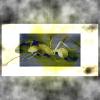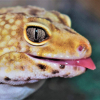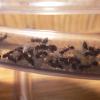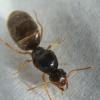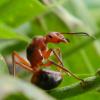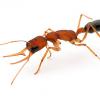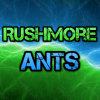I don't think this should be treated lightly. While honeybees are invasive, they provide jobs for about 125,000 people. And, they may kill people who are allergic. Its not like they are non-aggressive. If that were the case, they would not be a problem. If they are allowed to get a foothold, it could potentially ruin the lives of many people, and people would be less likely to go on outdoors activities, reducing sales in outdoor industries.This would result in a further loss in jobs. The also will not stop at invasives. I would almost be willing to bet they would go for natives as well.
that's just my two cents though. And I'm naturally biased against Vespines. But, I still don't think it is just something to shrug off. Would you want to go outside and be met with a hornet that will leave you in severe pain for hours?
I just don't like them because
1. They spread disease to native bees
2. They take more honey then they need (can someone corroborate that? It seems reasonable for an economically viable bug who makes honey)
3. They are really overrated. Everyone always peddles the environmental BS "wE nEeD bEeS" and talking about how honey bees are dying but these people really do not have a good understanding of the NA ecosystem and bees in general. Pollinating species of wasp, beetles and ants exist people! Also natives, solitary bees are underrated.
When you say "I don't like them" I'm interpreting you mean you don't like European Honey Bees. Is that correct? Do you mean feral honey bees, farmed honey bees, or both?
What do you mean "they take more honey than they need"? Do you mean honeybees or the wasp that kills them? I'm not sure what you are trying to say.
Your point about people not really understanding the honeybee, and proclaiming it to be necessary to be saved to protect the envioronment is solid. People who make about North America that claim know little about bees, or the ecosystem.
The honey bee is in no danger of extinction. Some of our native pollinators are. That being said, if you know specific damage to the ecosystem that is caused by the honey bee I'd like to learn more about that. As far as I know native pollinators are threated by loss of habitat, and pollution, but not by the honey bee..

